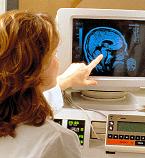 Traumatic brain injury (commonly referred to as TBI) is sudden physical damage to the brain. Brain injury may impair a person’s ability to function in family, social and work environments.
Traumatic brain injury (commonly referred to as TBI) is sudden physical damage to the brain. Brain injury may impair a person’s ability to function in family, social and work environments.
The attorneys of The Oshman Firm have seen the devastation that brain injuries can cause, and we are proud of our successful record of helping victims of TBI. Originally founded over 35 years ago with the guiding principles of service to our clients and excellence in advocating their cases, The Oshman Firm strives to create an environment where every client’s case is handled as the most important one in the firm. First and foremost, our clients are provided the time, attention and respect they deserve when entrusting their legal matters to us.
In the United States, the leading cause of traumatic brain injuries is motor vehicle accidents. Motor vehicle accidents account for 50 percent of all cases of brain injury in victims under 75. A brain injury can occur when the head has been struck by an object such as a windshield or the brain undergoes a sudden acceleration/deceleration movement without a direct trauma to the skull. These forces cause bruising, bleeding and twisting. Damage to the brain may occur at the time of the accident, or develop over time as tissues swell and bleed within the head. Brain injury may lead to permanent or temporary impairment of the brain’s functions. Skull fractures, bruises of the brain (hematoma), and nerve damage are often related to such brain injury.
Brain injuries are more common in side-impact car accidents than in rear-end auto accidents, often related to the quick acceleration and deceleration of the brain. The force causes the brain to move within the skull and sometimes breaks the skull to directly harm the brain The number of brain injuries in frontal crashes is far less due to the presence of air bags and seat belts.
Although air bags are very useful when they are designed properly, many air bag systems are not correctly made. As a result, there are thousands of serious air bag injuries. The National Highway Traffic Safety Administration reports that since 1990, airbag deployment has killed 227 people in low-severity crashes, including 76 drivers, 10 adult passengers, 119 children between the ages of 1 and 11, and 22 infants.
Defectively designed air bags are known to cause brain hemorrhages and severed brain stems, among other body injuries. These injuries have killed and paralyzed unsuspecting adults and children in collisions in which no one would have been injured in if the air bag didn’t deploy. Sometimes, the air bags are defective in that they don’t even deploy when they are needed.
How can you tell if you or someone else has suffered a traumatic brain injury? Here are the common symptoms among adults:
- Low-grade headaches or neck pain that won’t go away
- Having more trouble than usual with mental tasks (e.g., remembering, concentrating, making decisions)
- Slowness in thinking, speaking, acting, or reading
- Getting lost or easily confused
- Feeling tired all the time, lacking energy or motivation
- Changes in sleeping patterns (sleeping a lot more or having a hard time sleeping),
- Feeling light-headed or dizzy, losing your balance
- Increased sensitivity to sounds, light, or distractions
- Blurred vision, eyes that tire easily
- Loss of the sense of smell or taste
- Ringing in the ears
- Mood changes (e.g., feeling sad or angry for no reason)
Among children, the symptoms are:
- Listlessness or tiring easily
- Irritability or crankiness
- Changes in eating or sleeping patterns
- Changes in the way the child plays
- Changes in performance at school
- Lack of interest in favorite toys or activities
- Loss of new skills, such as toilet training
- Loss of balance, unsteady walking
Disabilities resulting from brain injury depend on several factors, including the severity of the brain injury, the location of the brain injury, and the age and general health of the brain injury victim. Common disabilities that result from brain injury are problems with cognition (reasoning and memory), communication, behavior, and sensory processing (sight, smell, hearing, touch, and taste). In addition, victims of brain injury may develop long-term problems such as Parkinson’s disease and Alzheimer’s disease. Compensation can be awarded to those that suffer from a brain injury. The brain injury lawyers of The Oshman Firm are qualified to win restitution for their clients.
While victims of minor brain injury frequently make a full recovery, those who suffer a severe brain injury often face permanent disability or death. Many brain injury victims face a long rehabilitation process and may not be able to return to work, causing a serious financial and emotional strain on both the brain injury victim and his or her family.
If you or a loved one has suffered a brain injury from a motor vehicle accident, The Oshman Firm wants to help you get the compensation you deserve so you can focus on healing. Call us today at 1-800-400-8182 or contact us online for a free case evaluation. We are always available to speak with you, and if you are unable to come to our offices for an initial case sign-
